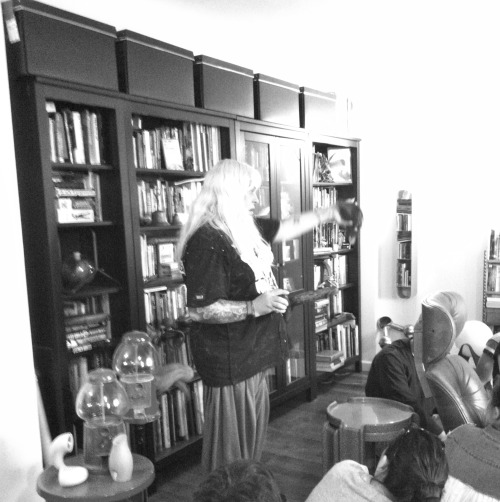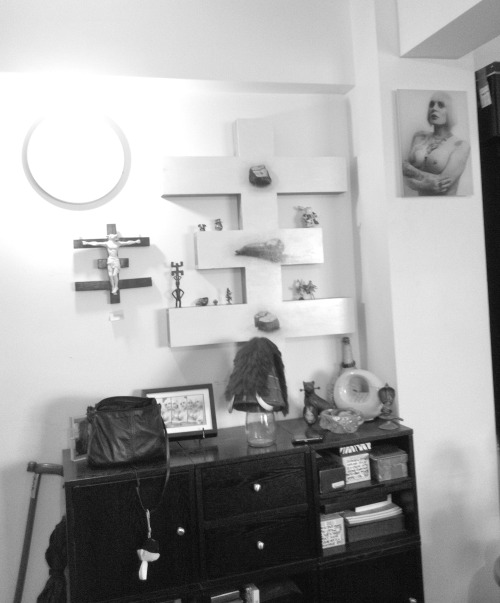STUDIO VISIT WITH GENESIS BREYER P-ORRIDGE
This past summer I had the pleasure of meeting Genesis Breyer P-Orridge of Throbbing Gristle and Psychic TV. I was given the opportunity thanks to my close friend Leigha, who happens to be one of Genesis' closest friends, as well as their (Genesis prefers to be referred to as "we") studio assistant. I've been a fan of Throbbing Gristle and Psychic TV since high school, so the opportunity to meet Genesis was completely surreal and nerve-wrecking, as I had the responsibility of leading the studio discussion in front of an entire class. I originally wanted to ask about Throbbing Gristle and delve into a discussion that was more centered around the birth of industrial music, but due to Genesis' relationship with the other members of Throbbing Gristle, I felt it would be an inappropriate and awkward discussion topic.
To give some brief background information, Genesis Breyer P-Orridge, born Neil Andrew Megson, was one of the founding members of Psychic TV and Throbbing Gristle. Born February 22, 1950 in Manchester, s/he essentially pioneered the start of industrial music with the formation of Throbbing Gristle in 1975.
Throbbing Gristle were a multimedia project that experimented with noise and live visuals, eventually leading to the birth of industrial music as a genre. Other band members included Cosey Fanni Tutti and Chris Carter (both later went on to form industrial band Chris & Cosey), and Peter "Sleazy" Christopherson. They were known for having rather confrontational live performances, experimenting with noise, using standard instruments for the purpose of creating noise and layered sounds, as well as incorporating unconventional objects for sonic purposes. Genesis P-Orridge states in the book Rip It Up and Start Again, "…[we were] making up music on the spot, undeterred by lack of grounding in improvisational technique, using broken violins and prepared piano as well as conventional rock instruments like drums and electric bass. Inspired by John Cage's writing and by primitivists like the Fugs and the Velvet Underground, [we] believed that 'the future of music lies in nonmusicians.'" Throbbing Gristle disbanded in 1981, which led to the formation of P-Orridge's next project, Psychic TV, in 1982.
PTV were a video art and music project that experimented with a wide variety of sounds ranging from experimental, post punk, psychedelic, and acid house. Psychic TV were a multimedia project that also gives credit to a rotating lineup of contributors including Coil, Current 93, Rose McDowall, Soft Cell, and many more. Thee Temple of Psychick Youth was formed as a supplementary organization to the band that was focused on the spiritual, mystical, and the occult. Through this organization came the visual aspect of Genesis' work, as s/he found and collected things from all over the world, field recordings, essentially anything tangible that would contribute to her current or future projects.
We made our way down to the Lower East Side to visit Genesis at home on the corner of Grand and Essex. Originally the visit was intended to be held at her studio but s/he was preparing for his/her retrospective at the Warhol Museum in Pittsburgh, so the majority of her pieces had already been shipped off to the museum. We were met in the lobby by my friend Leigha, who led us into the elevator and up to the fifth floor where Genesis lived. We entered the apartment which was essentially a hoarder's paradise, but a very organized hoarder's paradise. To the left was Psychic TV and Thee Temple of Psychick Youth ephemera decorating the walls, an enormous black bookcase filled with all different types of books, ranging from music to art and the occult, etc. His/her desk was in the center of the room facing the window, and surrounded by all kinds of Psychic TV/Throbbing Gristle ephemera. S/he greeted me with a kiss on the cheek and let me hold her new dog Musty (who originally belonged to James Iha of the Smashing Pumpkins). I started feeling nervous and almost nauseous as I looked through my notes, trying to decide what question to start off the discussion with, when s/he dove right into telling stories from past tours, immediately taking the pressure off. S/he began telling us about a past tour with Love & Rockets, Monte Cazazza, and others, as well as his/her new project with Trent Reznor of Nine Inch Nails at our mutual friend's record store and studio Heaven Street (located in Brooklyn).
S/he lectured us on the importance of collecting, preserving, archiving, not throwing anything away. S/he showed us a shoe horn that she had acquired many years ago while still in Throbbing Gristle, which s/he used to create demonic and strange sounds, originally intended for a Throbbing Gristle song, but ended up saving the piece using it fifteen years later for his/her new project with Trent Reznor/NIN. S/he told us, "don't throw stuff away especially if it has some spiritual or personal resonance. You never know what will come of it later on in life. Keep everything. You don't know when you will use it."
"What is existence?" s/he said. S/he told us that making art was a symbol of process, that they were magical works and magical rituals. "Making art is a spiritual quest. We have enough stuff. Art is the psychic healer of the tribe. Why have an aesthetic plan? Why is it that we do this?" The conversation slowly dove into the question of experimenting and breaking out of habit. S/he said, "if you know you've got a habit, learn to try to break it." Leading the discussion into the topic of essentially being different, we discussed creating a global shift and "fucking up the status quo." The birth of Throbbing Gristle was to fuck up the status quo and create a huge global shift. S/he states in Rip It Up and Start Again, "Routines and habits, roles and expectations, were deliberately disrupted, with members sleeping in a different bed each night, selecting clothing out of a communal chest every morning, and eating meals at odd times." S/he encouraged me to keep collecting, recording noise, creating field recordings, constantly make work and they don't have to be final and finished pieces, continue to collaborate with others that have the same interests, and keep those who you love beside you and in your life because "we shouldn't be afraid of completely submitting to the other person, the person we love. Be submissive. See a cliff, jump off of it."




this was such a cool interview
ReplyDelete